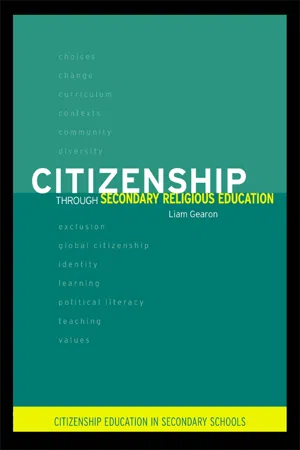
Citizenship Through Secondary Religious Education
Liam Gearon
- 208 pagine
- English
- ePUB (disponibile sull'app)
- Disponibile su iOS e Android
Citizenship Through Secondary Religious Education
Liam Gearon
Informazioni sul libro
Religion has achieved ever greater prominence in debates about citizenship at every level of cultural, economic, social and political life. Citizenship through Secondary Religious Education highlights some of the key issues surrounding citizenship for the R.E. teacher.
Topics selected include those of historical and immediate relevance to teaching citizenship through religious education. There are chapters covering general critical planning issues and those concentrating on specific themes such as:
- The open society and its enemies
- planning for citizenship through religious education
- genocide
- asylum
- freedom of religion and belief
- sustainable development
- the rights of indigenous peoples.
Practical in its style, the guidance presented in this book will be invaluable to teachers and student teachers of religious education and specialists in citizenship. Those who have been allocated responsibility for teaching Citizenship or Religious Education, or are looking to teach them as second subjects, will also find this book a useful resource.
Domande frequenti
Informazioni
Part I
Citizenship and religious education: critical contexts and planning issues
Chapter 1
The Open Society and Its Enemies
Citizenship and religious education
Introduction
Crick and National Curriculum citizenship
- Social background research The development of values through the life of the school How significant is the development of early moral emotions?
- What does ‘caring’ mean and how does it contribute to children’s moral development?
- How far do school councils help young people to understand their rights and responsibilities as citizens?
- Does the involvement of pupils in the formation of classroom rules and social policies on discipline help them develop the motivation to behave responsibly? What kinds of influence can extra-curricular activities have on the behaviour and attitudes of children and young people?
- How far does the example set by teachers intentionally or otherwise influence the developing values and attitudes of their pupils?
- What does spiritual development mean?
- How can schools foster the values of non-discrimination and equal opportunities?
- Theoretical framework and strategies
- How can schools contribute to the character development of students?
- What specific strategies and programmes for the development of moral reasoning have been effective in school?
- How do personal narratives help teachers to understand and influence the moral development of young people?
- What contribution can the subjects of the National Curriculum make to the development of pupils’ values and attitudes?
- What can religious education and personal and social education contribute to pupils’ developing attitudes and values?
- How do the cross-curricular themes contribute to the development of pupils’ values, attitudes and personal qualities?
- How effective is circle time in helping pupils to develop self-esteem and to clarify their own attitudes and values?
- What other teaching and learning methods have been found effective in influencing pupils’ attitudes and behaviour?
- Curriculum and teaching methods
- What methods have proved effective in identifying developments in pupils’ values and attitudes?
- How can school effectiveness be evaluated in terms of the development of pupils’ values and attitudes?
- Assessing and evaluating the development of pupils’ values.
- The sets of conclusions, in the form of research implications for teachers, for school policy, for inspection and for future research, are reproduced in Box 1.1.
- build, where appropriate, on the foundations of moral development laid in the home and continue to seek partnerships with parents and other carers;
- pay due attention to the development of moral reasoning while not neglecting children’s emotional and spiritual development;
- encourage children’s active involvement in the running of the school community;
- aim for consistency in reinforcing the school’s fundamental values;
- reflect on their own values and on the appropriateness of the example they set through their personal and professional conduct;
- encourage children to take part in a variety of activities which develop character and personal qualities, and provide opportunities for them to reflect on the moral issues which arise in these activities;
- ensure that the learning that occurs through their relationships with their pupils through peer interactions and through the life of the school is as positive as possible; reflect on the potential within school subjects and cross-curricular themes to raise questions of value;
- explore different methods for developing pupils’ values, attitudes, and personal qualities;
- help pupils to develop a sense of their own moral identity and to become gradually more aware of the complex and controversial nature of many moral values;
- focus on specific aims in values education, directed at specific learning outcomes;
- develop methods of measuring and recording pupils’ growth and development in these areas.
Research implications for school policy and practice
- responding sensitively to the diverse and possibly irreconcilable expectations of national education policy, local communities, parents and pupils themselves, in the light of teachers’ personal views and professional expertise;
- working towards shared values, which are given a high profile and made explicit in a range of school policies, structures and procedures understood and owned by all members of the school community;
- developing a whole-school approach to values education, drawing on clear and coherent theoretical frameworks and strategies;
- engaging in ongoing reflection on and review of school life, the curriculum, teaching methods and partnerships with parents and communities to raise awareness of values issues.
Research implications for school inspection
Directions for future research
Indice dei contenuti
- Cover Page
- Title Page
- Copyright Page
- Boxes
- Acknowledgements
- Introduction The City of God
- Part I: Citizenship and religious education: critical contexts and planning issues
- Part II: Citizenship through religious education: rights, wrongs and responsibilities